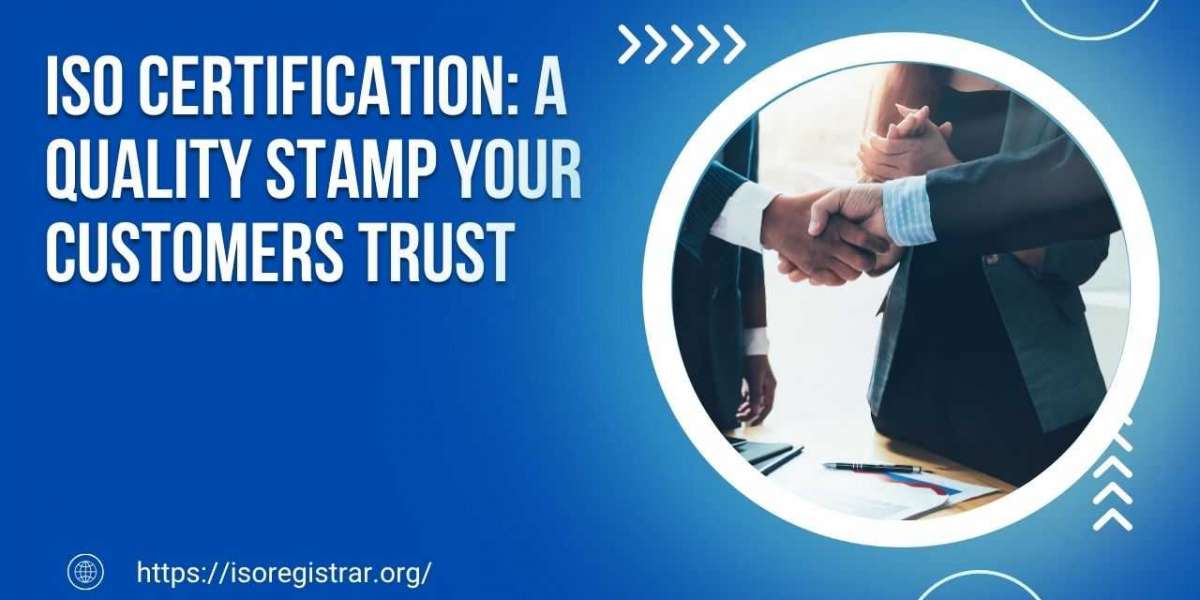In today’s competitive business landscape, trust plays a central role in consumer decision-making. One way companies around the world demonstrate their commitment to quality, consistency, and continuous improvement is through ISO Certification. For customers, seeing the ISO mark is often enough to feel confident in a brand's products or services. In this blog, we’ll explore what ISO certification means, why it matters to your business, and how it builds trust with your customers.
What is ISO Certification?
ISO stands for the International Organization for Standardization—an independent, non-governmental body that develops standards to ensure the quality, safety, and efficiency of products, services, and systems. ISO certifications are issued by external bodies after thorough audits to confirm that a company meets international standards.
Common ISO Standards
- ISO 9001 – Quality Management System
- ISO 14001 – Environmental Management System
- ISO 45001 – Occupational Health and Safety
- ISO 27001 – Information Security Management
- ISO 22000 – Food Safety Management
Each of these certifications addresses specific business areas, and obtaining one demonstrates that your company follows internationally recognized best practices.
Why ISO Certification Matters
1. Proves Your Commitment to Quality
An ISO-certified company shows it is serious about meeting customer expectations, maintaining consistent processes, and improving continuously. For clients and end-users, this adds a layer of assurance that they’re choosing a responsible and professional brand.
2. Boosts Customer Confidence
Customers often look for signs that a business is reliable before engaging with it. Displaying an ISO certification instantly builds credibility, especially for new customers who don’t have prior experience with your brand.
3. Enhances Business Reputation
In industries like manufacturing, food production, IT, or healthcare, ISO certification is not just preferred—it’s expected. Holding a valid ISO certificate enhances your professional image, especially when bidding for projects or applying for contracts.
How ISO Certification Builds Trust with Customers
Demonstrates Consistency
An ISO-certified organization follows defined processes and protocols. This leads to consistency in product or service quality, which customers value highly. They know what to expect every time they do business with you.
Promotes Transparency
ISO standards require proper documentation, traceability, and clear communication. This level of transparency gives customers peace of mind that the company can be held accountable and trusted.
Shows Responsibility and Safety
Whether it’s about protecting the environment (ISO 14001) or ensuring food safety (ISO 22000), ISO certification proves a company’s commitment to responsible practices. This is particularly important for health-conscious or socially aware customers.
Business Benefits Beyond Customer Trust
Opens Doors to Global Markets
ISO certification is recognized internationally, making it easier to enter foreign markets and collaborate with global partners who require certified suppliers.
Improves Internal Efficiency
The certification process helps businesses identify weaknesses, streamline processes, and reduce errors or waste. This improves overall performance, which customers benefit from too.
Reduces Risk
Having documented procedures in place allows for better control and risk management, making your operations more resilient and reliable.
Steps to Get ISO Certified
Identify the Appropriate ISO Standard
Begin by selecting the ISO standard that best suits your industry and business goals—for example, ISO 9001 for quality management or ISO 27001 for information security.
Access the Certification Portal
Visit the official ISO certification provider’s website or the portal of an accredited certification body.
Complete the Application Form
Fill out the digital application form with your company’s accurate and up-to-date information, including the nature of business, location, and desired certification.
Review and Submit Your Details
Carefully go through all the information you’ve entered. Once you’re confident it's correct, apply for review.
Make the Payment
Pay the applicable certification fee securely through the available online payment options.
Consultation and Standard Confirmation
A certification expert will reach out to verify the chosen ISO standard and may guide you through any additional steps if required.
Receive Your ISO Certificate
Upon successful verification and approval, your ISO certificate will be issued and sent to your registered email address in digital format.
Tips for Using ISO to Strengthen Customer Relationships
- Showcase Your Certificate – Display it on your website, product packaging, and company brochures.
- Include ISO in Marketing – Highlight your certification in sales pitches and advertisements to emphasize trust and professionalism.
- Train Employees – Make sure your team understands what the certification means and how it benefits the customer.
- Use Feedback for Improvement – Leverage ISO’s focus on continual improvement to act on customer feedback.
Also Read: How to get the ISO(9001) Certification process in India
Conclusion
ISO certification is more than just a badge; it’s a symbol of trust, reliability, and quality. It assures your customers that your business meets the highest international standards and is committed to improvement and excellence. Whether you're a manufacturer, service provider, or startup, investing in ISO certification can pay off by enhancing your reputation, expanding your reach, and building a loyal customer base.







